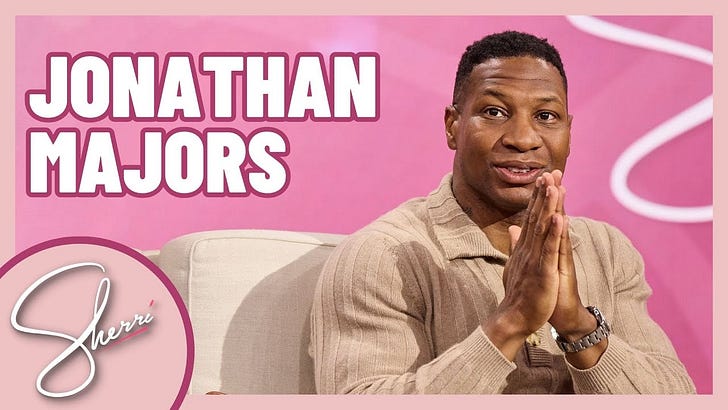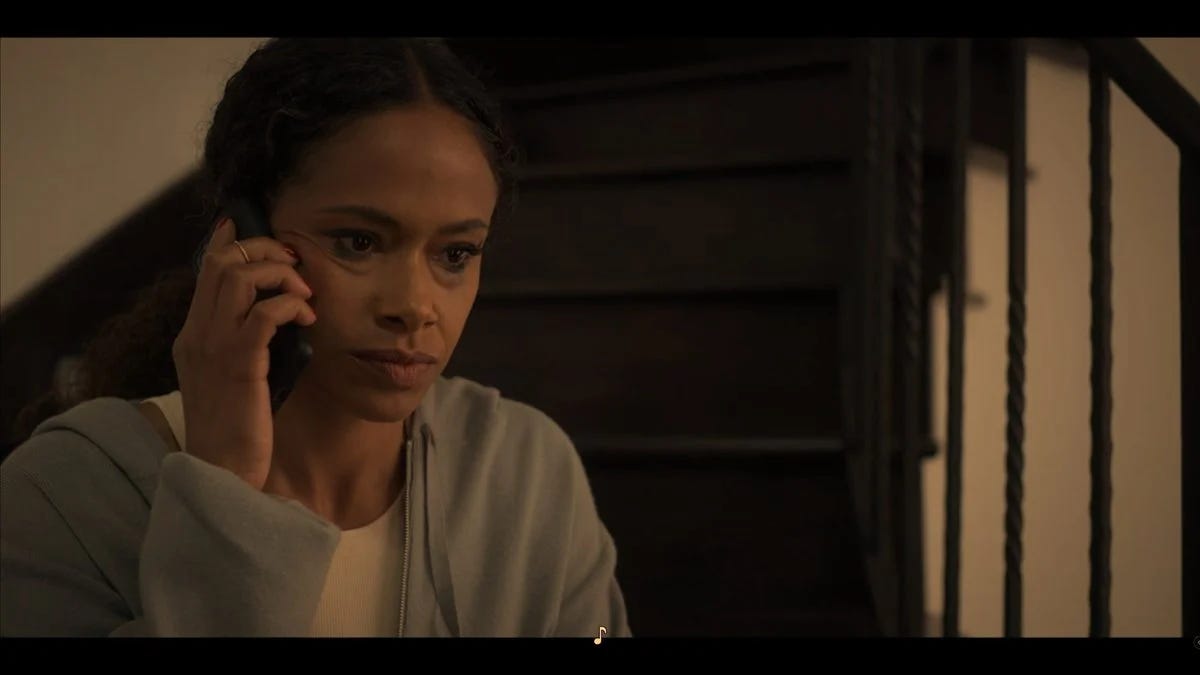Trigger Warning: This newsletter contains discussions and references to abuse, including emotional, physical, and sexual abuse. It’s understood that these topics can be distressing and may trigger intense emotional responses.
Hollywood has long had a reputation for glamour, wealth, and influence. But beneath the red carpets and award shows lies a disturbing reality—one of systemic abuse, silencing, and neglect of victims. Powerful people, including executives, directors, and even religious figures, have worked to protect abusers while victims are ignored, discredited, or cast aside. Representation of abuse in media can be triggering, yet it is vital for awareness and change. The industry’s hypocrisy was laid bare once again when Jonathan Majors, convicted of assaulting his former partner, appeared on Sherri in a shockingly tone-deaf interview that disregarded victims' suffering.
Hollywood has long protected its abusers. From the infamous casting couch culture to the systemic shielding of figures like Harvey Weinstein, Roman Polanski, and Bill Cosby, the industry has a well-documented history of allowing predators to thrive. Survivors who come forward face blacklisting, career sabotage, and relentless character attacks.
Powerful men (and sometimes women) are able to continue working and even receive industry accolades despite credible allegations against them. Meanwhile, victims are labeled as troublemakers, attention-seekers, or liars. When allegations surface, studios and PR teams often focus on damage control rather than accountability.
The #MeToo movement shed light on this reality, but even in its wake, change has been slow. Many abusers still work in the industry, and some have successfully staged “comebacks” while their victims remain silenced. The industry’s historical disregard for victims extends beyond individual cases—it reflects a deeply entrenched culture that prioritizes profit over people.

The "casting couch" is one of Hollywood’s oldest and darkest open secrets. Aspiring actors, particularly women, have long been expected to trade sexual favors for roles. This culture of exploitation persists in subtler forms today. The imbalance of power between industry gatekeepers and those trying to build careers creates an environment where abuse thrives unchecked.
While movements like #MeToo have brought this issue into the public eye, real accountability remains rare. Many abusers operate in plain sight, knowing that the industry will shield them as long as they generate profit. Survivors, on the other hand, are often left to suffer in silence, their careers derailed and their reputations smeared.

When victims do speak up, the response is often brutal. Many lose job opportunities, face lawsuits, and endure harassment both online and in real life. High-profile cases like those of Rose McGowan and Ashley Judd have shown the immense cost of coming forward. Their courage helped expose predators, yet they faced career setbacks while their abusers continued working for years.
This sends a clear message to survivors: silence is safer. Hollywood has created an environment where speaking out is more dangerous than being an abuser.
One of the most insidious aspects of Hollywood’s abuse problem is the way religious figures and powerful institutions cover up wrongdoing. Just as we’ve seen in the Catholic Church and other religious organizations, many Hollywood abusers are shielded under the guise of faith, redemption, and second chances.
There is a long history of abusers invoking religion to deflect responsibility. Whether it’s a pastor publicly supporting an actor accused of assault or an abuser himself claiming that faith has led him to “reform,” the tactic is often a calculated move to regain public sympathy. In reality, this serves as another means of silencing victims by positioning the abuser as a man of faith and redemption while casting doubt on the accuser’s intentions.
As one survivor put it, “Jonathan isn’t a man of God, he is a man of man.” This powerful statement underscores how religious rhetoric is often weaponized to deflect blame, rather than to seek genuine accountability.

Religious organizations, much like Hollywood, are built on hierarchical power structures that make it easy to cover up abuse. Leaders are often placed on pedestals, their actions beyond scrutiny. This reverence makes it difficult for victims to come forward and be believed.
When allegations arise, religious leaders often preach forgiveness rather than justice. This allows abusers to continue their careers with little to no consequences while survivors are pressured into silence. Hollywood has exploited this strategy repeatedly, positioning powerful men as "redeemed" after scandals, while ignoring the voices of those they harmed.
When Hollywood does address abuse in media, the results are mixed. On one hand, representation of abuse survivors and their experiences can be cathartic for some and can raise awareness for audiences unfamiliar with the realities of assault, domestic violence, and coercion. Shows like Maid and documentaries like Surviving R. Kelly shine a necessary spotlight on abuse, forcing conversations about power dynamics and accountability.
However, these portrayals can also be deeply triggering for survivors. Seeing their trauma play out on screen—sometimes in exploitative ways—can reopen wounds. Worse, Hollywood often profits off these narratives while continuing to protect actual abusers behind the scenes. Survivors are left feeling as though their pain is commodified for entertainment rather than taken seriously.
Many films and TV shows sensationalize abuse rather than addressing it with care. Graphic depictions of violence often prioritize shock value over survivor narratives. This can lead to further harm, as audiences consume these stories without understanding the real-life consequences of abuse.
Hollywood must do better in its storytelling. Survivors deserve to see their experiences represented authentically, with a focus on healing and justice rather than trauma for entertainment’s sake.
Jonathan Majors’ recent appearance on Sherri was a prime example of Hollywood’s lack of concern for survivors. Despite being convicted of assaulting his former partner, he was given a platform to paint himself as a victim of circumstance, rather than someone responsible for his actions. The interview was a masterclass in image rehabilitation, filled with vague statements about redemption, faith, and resilience—without any real accountability.
For survivors, this was a slap in the face. Watching an abuser be handed a sympathetic platform, while so many victims struggle to be believed, sends a clear message: powerful men will always find a way back, while survivors are left to pick up the pieces alone.
This is why representation in Hollywood must go beyond storytelling—it must also include real-life accountability. The industry cannot claim to care about abuse victims while simultaneously uplifting abusers. There must be systemic changes to ensure that abusers are not given endless second chances while victims are discarded.
It’s time for Hollywood to stop protecting abusers and start prioritizing victims. This means:
Holding abusers accountable: Stop giving convicted abusers platforms and comeback opportunities while survivors are left unheard.
Supporting survivors: Provide real support systems, legal aid, and resources for those who come forward.
Reevaluating representation: Ensure that portrayals of abuse in media center survivors' voices rather than exploiting trauma for entertainment.
Dismantling power structures: Hollywood needs to change the systems that allow abusers to thrive unchecked, whether through stronger workplace protections or independent review boards for allegations.
Until real change happens, Hollywood will continue to be a place where abusers find redemption while survivors are left in the shadows. It’s up to audiences, creators, and industry professionals alike to demand better.
Survivors deserve more than empty apologies and PR-driven redemption arcs. They deserve justice.
Breaking the Silence: The Importance of Intervention on International Day for the Elimination of Violence Against Women
Trigger Warning: This newsletter contains discussions and references to abuse, including emotional, physical, and sexual abuse. It’s understood that these topics can be distressing and may trigger intense emotional responses.









